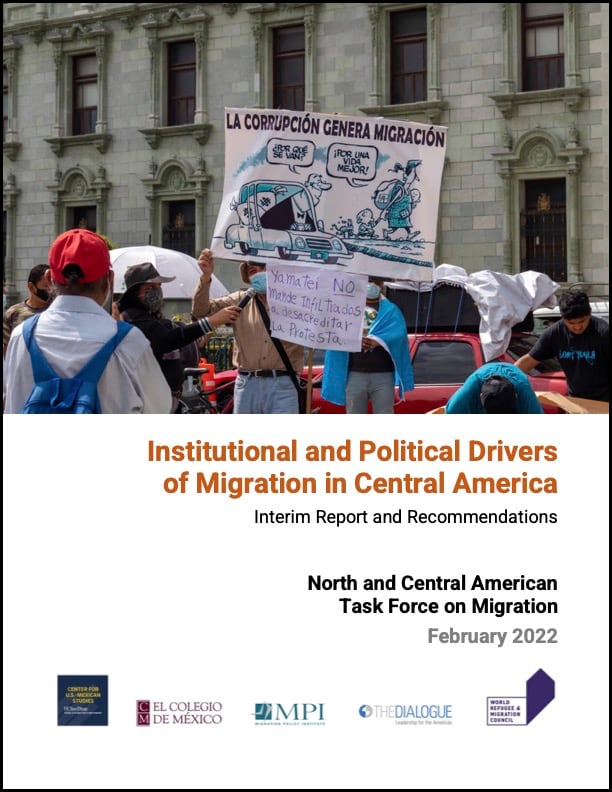Interim Report and Recommendations: North and Central American Task Force on Migration

When Central American migrants are asked why they decided to leave their countries, they give a variety of responses; they’re seeking better economic opportunities, family reunification, protection from extortion and criminal violence, hope for a better future for their children. Often it is a combination of factors that drive migration, and the drivers of migration are themselves linked. Criminal gangs are linked with corruption. Poverty is exacerbated — or caused — by poor governance. Low economic growth is tied to weaknesses in rule of law and lack of accountability. Because of corruption and entrenched elite interests, tax revenues are insufficient to provide adequate public services. Even the effects of environmental hazards are shaped by poverty and political factors. It is hard to separate out the political drivers of migration — corruption, lack of accountability, criminal violence, weak rule of law — from the economic and environmental pressures that lead hundreds of thousands of Central Americans to leave their homes and make the often-treacherous journey northwards. The table below, based on a 2019 survey of those intending to migrate, clearly demonstrates the primacy of economic drivers of migration with victimization by violence reported as the second most common reason. While two-thirds of respondents have a relative living abroad, only 3 percent across the three countries of Northern Central America indicated that family reunification was their primary motivation for migration.
This is one of two reports on addressing root causes of Central American migration; the other report focuses on economic and environmental drivers of migration. We recognize that economic and political drivers are closely related and that it is somewhat artificial to separate them. But we also believe that until the political drivers are tackled, it will be difficult to address the economic causes. Simply providing more economic assistance will not stop migration. In fact, as we will consider in the next report, economic development often leads initially to more migration — which only falls when a certain per capita income is reached. Costa Rica also provides an interesting counterpoint; while the country has problems, it also is known for its strong rule of law (as well as its lack of a standing military) and Costa Ricans are not organizing caravans or migrating northwards in large numbers.
There is no bypassing the thorny issues of political drivers of migration. Unfortunately, there are also no quick fixes. Corruption and organized crime have both been a constant presence in Northern Central America for the past two decades. As Norma Torres, US House of Representatives, said at a 2019 Wilson Center event, “Washington is the type of place that expects quick, flash results. Attention spans are very short, but the kind of change that is needed in Central America is the kind of change that takes decades, if not generations, to see through.”
Short-term measures — such as some of those being pursued by the Biden administration — seem to prioritize limiting migration over supporting efforts to address root causes, such as anti-corruption measures. This is politically expedient but is sending the wrong message to Central American governments — that if they meet US demands to curb migration they will be left alone to deal with internal political concerns — including in ways that lead to more migration.
As this report emphasizes, the role of civil society is crucial. Civil society organizations in Central America and Mexico are strong and professional; they have made impressive contributions in diagnosing the region’s problems — often at considerable risk to themselves. But in order to bring about lasting change in public institutions, the state needs to do its part. We believe that the private sector has an important role to play. While some business interests are linked to corruption, others are investing time and energy in supporting measures to strengthen rule of law, transparency and accountability.
If the root causes of Central American migration are to be addressed, steps must be taken now that will likely only pay off years from now. While the issues are difficult to tackle, we believe that a strong comprehensive regional framework — such as that outlined in our report on regional cooperation co-responsibility will provide the political space to deal with some of these issues. In this report, we consider issues around rule of law and accountability, corruption, and criminal violence — issues which are related to each other and which, as we will see in the next report, also deeply affect poverty, inequality, and disaster risk. These issues cannot be addressed without confronting fundamental problems of governance in which corruption has become entrenched. “Poor governance is what underlies violence, impunity, insecurity and lack of economic investment. And all of the region’s governments either abet or embody corruption” (Call 2021).
This report was informed by Task Force research papers prepared by Jaime Ordóñez on rule of law (La pobreza como causa esencial de la expulsión humana y la migración (Centroamérica 2021-2022), available in Spanish only), and Pamela Ruiz on criminal violence (Criminal Governance in Northern Central America).
The North and Central American Task Force on Migration is a non-governmental forum of academics, civil society and business leaders, and former policymakers in dialogue with current government officials created to facilitate a broadly driven solution dialogue among the countries involved in the crisis of migration and forced displacement in the region. Initiated by the World Refugee & Migration Council with the Center for U.S.-Mexican Studies, El Colegio de México, the Migration Policy Institute and the Inter-American Dialogue, the task force will issue concrete recommendations for collective, regional action based on evidentiary research to promote responsibility sharing across North and Central America.

